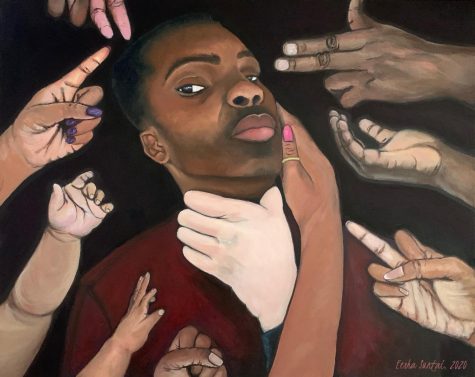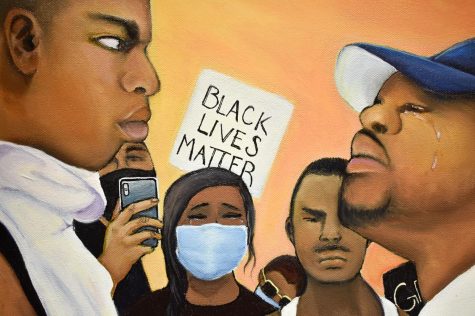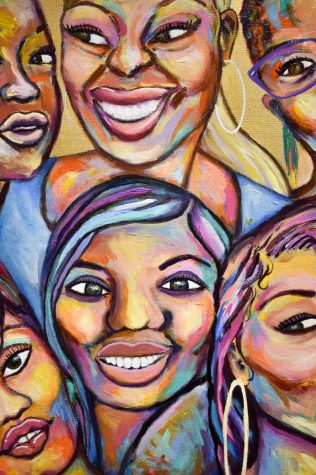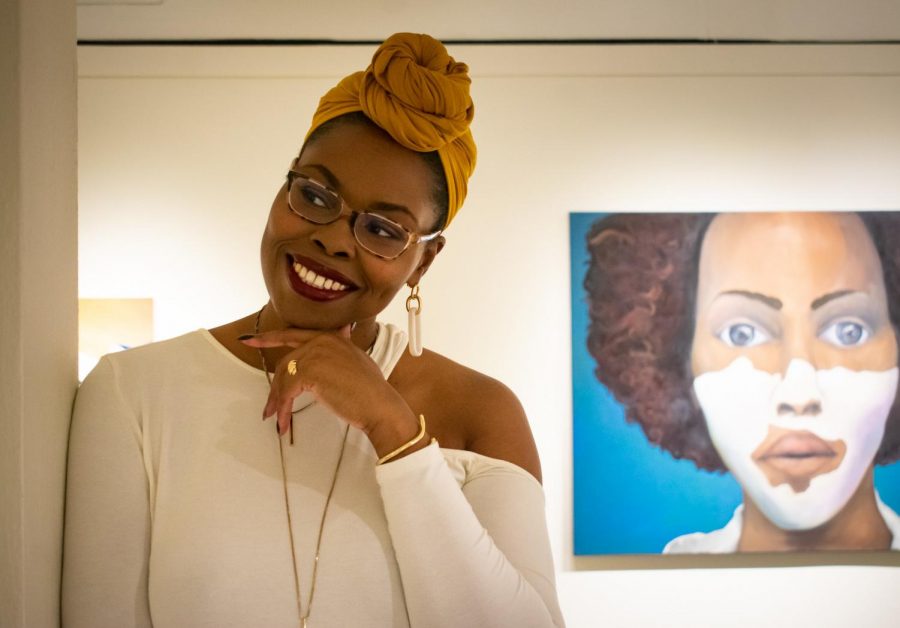Last Wednesday, the Augusta Savage Gallery in New Africa House debuted artist Eesha Suntai’s exhibit “Dear Black Child,” a collection of paintings that explores her perspective on Black identity in the United States. The exhibit includes 14 paintings, with standouts featuring portraits of subjects with penetrating gazes. At the entry to the gallery is “The Offering,” a small still life of Suntai’s own hand cradling a succulent nectarine.
For Suntai, a painter based in New York who studied studio art at Adelphi University, bold color is central to her storytelling. Influenced by colorful early-20th century Fauvism and hyperrealism, she primarily uses oil and acrylic paints, and occasi
onally incorporates gold spray paint as a base to create a glow effect.
“‘Dear Black Child’ is like a visual diary of my experiences growing up as an African-American child,” Suntai said. “Through each painting, the subject is telling a story of who and how they identify.”
Works on display range from movie stills to portraits of friends, family and herself. Suntai wants her portraits’ subjects to take on an active role.
“Even though I use a lot of bright colors, there’s a glare that creates tension,”Suntai said. “I wanted the subject to have control, and the observer to simply be the observer.”
Suntai hopes to capture a range of emotional experiences.
“Plight of the Black Man,” Suntai’s winning submission to the 2020 digital exhibition “Breathing While Black” in response to George Floyd’s murder, portrays a Black man surrounded by grasping hands.
“The strangulation of George Floyd is the actual strangulation of what’s happening to communities of color,”Suntai said. “We as a culture are being strangled.”
Interim gallery director Alexia Cota knew she wanted to invite Suntai to exhibit at the University of Massachusetts when she reviewed Suntai’s submission. “Immediately it stood out as a very powerful piece,” she said.
 Cota invited Suntai to speak at the virtual opening reception of the exhibition. “The way that she captures people,” Cota said. “That’s what struck me the most.”
Cota invited Suntai to speak at the virtual opening reception of the exhibition. “The way that she captures people,” Cota said. “That’s what struck me the most.”
“Black Boy Joy” is a portrait of two young boys that captures a snapshot of childhood whimsy. “With kids, you say, ‘Take a picture!’ and they put two fingers up, turn their back, do a dance, they’re so free,” Suntai said.
Among the collection are three portraits of movie stills from Suntai’s senior thesis. “Insert Identity Here” depicts a piercing image of the main character, portrayed by Halle Berry in the 2010 film “Frankie & Alice,” who is a stripper with multiple personality disorder.
Suntai spent her childhood watching her mother work in a beauty salon. She was fascinated by the before-and-after transformations and salon magazine artwork.
“It wasn’t all just pictures of pretty women — it was actual art,” she said. “It was women in the 1980s. It looked like graphite pencil on paper. When I saw those, I said, ‘I want to do that.’”
Zach Boisvert, a senior marketing and journalism double major who attended the show’s opening reception, is most drawn to the vibrant palette of the six women in “Highly Melanated (Squad).” “The play on color is poetic,” he said.
Presented in partnership with UMass Women of Color Leadership Network, “Dear Black Child” will be free and open to the public from 5 to 7 p.m. at the Augusta Savage Gallery at the New Africa House until Dec. 10. Visit the Fine Arts Center website for more information.
Elizabeth Beanland can be reached at [email protected].



















